- Home
- Regan Walker
Summer Warrior (The Clan Donald Saga Book 1)
Summer Warrior (The Clan Donald Saga Book 1) Read online
SUMMER WARRIOR
Book One in The Clan Donald Saga
REGAN WALKER
This is a work of fiction. Names, characters, places and incidents either are the product of the author’s imagination or are used fictitiously. Any resemblance to actual events, locales, business establishments or persons, living or dead, is coincidental.
SUMMER WARRIOR
Copyright © 2020 Regan Walker
All rights reserved. Unless specifically noted, no part of this publication may be reproduced, scanned, stored in a retrieval system or transmitted in any form or by any means, electronic, mechanical, photocopying, recording, or otherwise, known or hereinafter invented, without the express written permission of the author. The scanning, uploading and distribution of this book via the Internet or by any other means without the permission of the author is illegal and punishable by law. Participation in the piracy of copyrighted materials violates the author’s rights.
Ebook ISBN: 978-0-9979905-8-4
Kindle Edition
PRAISE FOR REGAN WALKER
“The writing is excellent, the research impeccable, and the love story is epic. You can’t ask for more than that.”
—The Book Review
“Regan Walker is a master of her craft. Her novels instantly draw you in, keep you reading and leave you with a smile on your face.”
—Good Friends, Good Books
“Ms. Walker has the rare ability to make you forget you are reading a book. The characters become real, the modern world fades away, and all that is left is the intrigue, drama, and romance.”
—Straight from the Library
“Walker’s detailed historical research enhances the time and place of the story without losing sight of what is essential to a romance: chemistry between the leads and hope for the future.”
—Publisher’s Weekly
“…an enthralling story.”
—RT Book Reviews
“Spellbinding and Expertly Crafted…Walker’s characters are complex and well-rounded and, in her hands, real historical figures merge seamlessly with those from her imagination.”
—A Reader’s Review
ACKNOWLEDGEMENTS
I am indebted to photographer Paul Marriott for the magnificent cover photograph taken from the Isle of Man where he lives and works and where my story begins. You can see more of his talent at PaulMarriottphotography.com. In addition, because of all the places named in the story, I commissioned a map by illustrator, Bob Marshall, who did a wonderful job at helping my readers get a feel for where the story will take them.
The Clan Donald clan badge is used with the gracious permission of Clan Donald’s High Commissioner, Bill McDaniel.
As always, I must thank my splendid beta readers who help me get things right. These include Dr. Chari Wessel for all things to do with ships, even longships, and Liette Bougie, one of my readers who lives in Montreal and speaks French as well as English.
TABLE OF CONTENTS
Title Page
Copyright Page
Praise for Regan Walker
Acknowledgements
Map
Characters of Note
Book Description
It is no joy without Clan Donald
Chapter 1
Chapter 2
Chapter 3
Chapter 4
Chapter 5
Chapter 6
Chapter 7
Chapter 8
Chapter 9
Chapter 10
Chapter 11
Chapter 12
Chapter 13
Chapter 14
Chapter 15
Chapter 16
Chapter 17
Chapter 18
Chapter 19
Chapter 20
Epilogue
Author’s Note
Author’s Bio
Books by Regan Walker
CHARACTERS OF NOTE
Somerled MacGillebride, Lord of Argyll, Kintyre and Lorne
Ragnhild Olafsdottir, Princess of Man
Olaf the Red, King of Man and the Isles, Ragnhild’s father
Domnall, cousin to Somerled
Angus MacGillebride, Somerled’s brother
Affraic, daughter of Fergus, Lord of Galloway, and wife to Olaf the Red
Rognvald Kali Kolsson, Earl of Orkney
Abbot Bernard, a Savignac priest and Abbot of Rushen Abbey
Sweyn “the Skullcrusher” Asleifsson
Maurice MacNeill, foster brother of King Olaf
Ruairi MacInnes, one of Somerled’s galley captains
Liadan MacGilleain of Islay, Somerled’s self-appointed guard
Cicely, Ragnhild’s handmaiden
David I, King of Scots
Hugh de Morville, Deputy Constable of Scotland, and his wife, Beatrice de Beauchamp
Goubert d’Harcourt and Aubri de Mares, French stonemasons
Duncan MacEachern, blacksmith on Islay
Fergus, Lord of Galloway and his wife, Elizabeth
Edward Siwardsson, Lord High Constable of Scotland
Somerled’s parentage was noble, of the Kings of Dublin, the royal house of Argyll and the great Ard Ri, the High Kings of Ireland. But when the Norse invaded Argyll and the Isles, his family’s fortunes fell with those of his people. When all hope seemed lost, he rose from the mists of Morvern to rally the Gaels, the Scots and the Irish.
Sweeping across Argyll and the Isles like a fast-moving storm, brilliant in strategy and fearless in battle, Somerled began retaking his ancestral lands, driving away the invaders and freeing the people from the Norse stranglehold. In doing so, he would win the title Somerle Mor, Somerled the Mighty, Lord of Argyll, Kintyre and Lorne and, eventually, Lord of the Isles.
This is the unforgettable saga of his path to victory that forged the Kingdom of the Isles and won him the heart of a Norse king’s daughter.
It is no joy without Clan Donald,
It is no strength to be without them;
The best clan in the world;
To them belongs every goodly man.
The noblest clan ever born,
Who personified prowess and awesomeness;
A people to whom tyrants made submission;
They had great wisdom and piety.
A brave, kind, mighty clan,
The hottest clan in the face of battle,
The most gentle clan among women
And most valorous in war.
A clan who did not make war on the church;
They feared being dispraised.
Learning was commanded
And in the rear were
Service and honor and self-respect.
A clan without arrogance, without injustice,
Who seized naught save the spoils of war;
Whose nobles were men of spirit,
And whose common men were most steadfast.
~ From the poem by Giolla Coluim mac an Ollaimh, 1493
CHAPTER 1
Off the coast of the Isle of Man, summer 1135 A.D.
FROM THE DECK OF HIS GALLEY, rocking gently in the waters off the coast of Man, Somerled let his gaze stretch out across the azure sea to the green hills that sloped to the shore. He had paused in his voyage from Dublin back to Morvern in Argyll to give the crew a respite from the oars.
The sun-warmed grass of early summer blanketed the land like green velvet, beckoning to him. On the cliffs some distance away, a colony of cream-colored gannets with their black-tipped wings made raucous, throaty noises. Taking to the air, their cries became quieter as they flew to great heights and then plunged into the waters of the Irish Sea, catching fish.
> Glancing behind him, he saw his men lazing at the oars. Their conversations faded into the background as he turned back to the green isle to consider the one who reigned there as king.
Somerled had never met Olaf the Red but he had heard much about him.
Olaf Godredsson was an unusual Norseman, the younger son of the King of Dublin, who had succeeded to a throne initially meant for his eldest brother. For his protection, Olaf had been raised in the court of King Henry I of England. Known for his skill in diplomacy, Olaf’s many alliances had kept him in power and his kingdom at peace for decades.
Somerled was jarred from his musings by the sight of a white horse galloping across the sloping green hills. On the back of the magnificent palfrey, her hands entwined in the horse’s mane, rode a girl with long red hair. The horse’s mane and tail whipped about in the wind as he drove on, his mistress’ dark blue mantle flying out behind her.
She did not seem to notice the galley resting just offshore as she sped north.
If the fire in her eyes matched her wild abandon and her command of the horse, she would be a woman to covet.
Who might she be?
“Best keep your eyes in your head,” said his cousin, Domnall. “That one is not for you.”
“She rides like she owns the isle,” he said, tying his long hair at his nape to keep the wind from blowing it about his face.
Domnall chuckled. “Aye, she might as well. She’s Ragnhild Olafsdottir. The king’s only daughter.”
Watching her, Somerled recalled what he had heard about the daughter of the King of Man. Men spoke of her beauty, wisdom and intelligence, valued by her father no matter she was young and female. Around the night fires, they speculated on the man to whom Olaf would give such a prize.
“She looks to be sixteen or seventeen summers,” Somerled muttered.
“Aye, thereabouts.”
Without turning from the vision, he said, “Doubtless she will be bartered for lands and wealth—or peace with the Norse or even the Irish.” Such was the way of things.
“Aye, and a man must have all those in hand to offer for her.”
Somerled could offer nothing, having lost his lands and his family’s title to the Norse pirates who had long pillaged the shores of Argyll and the Western Isles, forcing the Gaels into slavery or worse. Even his father had fallen to a Norseman’s axe in an attempt to retake what was theirs. Somerled and his brother, Angus, had fought fiercely at Gillebride’s side, their faces splashed with the blood of their enemies, but to no avail.
When the girl was gone from sight, Somerled heaved a sigh and turned toward his men, shouting the order that would take them north into the Irish Sea.
“FLJÚGA!” RAGNHILD HISSED in Fairhair’s ears, urging him on. His hooves pounded the earth as she bent low over his neck, her fists clenched in his mane. It felt good to ride with the wind, as if in fleeing Castle Rushen she could flee the fate her father hinted he would inflict upon her.
She would not wed Rognvald Kolsson, the Norse warlord who was Earl of Orkney—a man she knew to be a murderer. Having tried to wrest control of the islands from Earl Paul, his second cousin, he had attempted to lure the people of Orkney to his cause with a promise to build a great cathedral. Yet behind the scenes, he had Earl Paul kidnapped and spirited away from Orkney, never to be seen again.
Ragnhild remembered the lustful glances the earl directed at her last eve while he and his men dined in her father’s great hall. The earl’s leers sent chills down her spine. Doubtless he would embrace evil to accomplish his ambitions.
Rognvald looked at her as if she were yet another isle to conquer, another land to possess. Nay, she would not wed such a man, no matter her stepmother’s plotting to be rid of her. If she were to marry at all, it would be a man like her father, clever and wise, a man who listened to her even if he did not always agree.
As she neared the rocky promontory above Niarbyl Bay, she reined in Fairhair and slid from his back, sending a hare running through the grass. Around her, summer’s green was broken only by patches of amethyst-colored heather, brilliant in the sunlight.
She left Fairhair to nibble on the grass and, telling her racing heart to calm, took a deep breath and stared out to sea. In the distance, she spied a galley, half the size of her father’s longships, its red sail unfurled to the wind. It was unusual for such a vessel to sail so close to their isle. She wondered at its purpose for only a moment before her thoughts turned back to the predicament that had troubled her for days.
Idly, she watched the gulls circling the bay, their harsh shrieks echoing her inner protests. At times like this, she missed the counsel of her mother. The pain of Ingibiorg’s loss was still sharp. As the daughter of the powerful Earl Hakon, who had ruled Orkney before Ragnhild’s birth, Ingibiorg grew up around fierce warlords appointed by the King of Norway. She would have known what to do.
In the years since her mother’s death, Ragnhild had grown into womanhood surrounded mostly by her father’s men and the castle’s servants. It was only natural she should assume the role of Rushen’s chatelaine, serving as hostess for her father. Organizing his household and entertaining his many allies pleased her, for his court drew important men who made for interesting conversations.
She had often accompanied her father on his voyages, sailing to the Hebrides, Ireland and Galloway.
She had no desire to leave. But she knew her stepmother wanted to be rid of her troublesome stepdaughter. Affraic was only a few years older than Ragnhild but not so pretty as Ragnhild’s mother had been. The queen was jealous of the respect and freedom Olaf bestowed upon his only daughter. Why, Ragnhild could not imagine. In truth, Affraic wanted little to do with the duties of running the castle that Ragnhild embraced.
But she knew her father’s thinking. An alliance with Orkney’s earl, particularly Rognvald, who was closely aligned with the King of Norway, would assure there would be no interference by the Norse in the affairs of Man and the Isles.
Fairhair nudged her shoulder, nickering.
“What am I to do?” she asked, turning to gaze into his obsidian eyes. “My father’s wife would have me gone, and now that she has given birth to a male child, Father will not gainsay her.” The look in Fairhair’s eyes seemed to convey sympathy, or mayhap it was pity.
Feeling the sun’s warmth on her back, Ragnhild brushed her fingers over the soft skin of Fairhair’s muzzle. “For certes, she is behind this unseemly match that would send me far from the shores of Man.” Using a rock as a step, she lifted herself onto the horse’s back, knowing she must return. “Had I not promised Father I would oversee tonight’s feast for the earl and his men, I would ride the twenty miles to the other end of Man and never return.”
On the bank of the river Gear Abhain, Loch Aline, Morvern, later that summer
SOMERLED EYED the large salmon just beneath the surface of the river Gear Abhain at the headwaters of Loch Aline. Its silver scales glistened in the pale afternoon light as it neared the surface of the dark waters, tempting him mercilessly.
The elusive creature had managed to avoid his spear these past many days, but he was determined to have it for dinner this night.
“Should I bring forth the remnants of last night’s meal?” asked Domnall with a raised brow and sarcastic tone as he stepped toward the riverbank.
“Nay, I shall have the great beast this day or die trying.” Somerled and his men had returned to Morvern where he lived simply in a cave near Loch Aline. After the battle that had robbed him of his father and so many of his clan, Somerled had not sought to return to Ireland. There, the son his wife had borne him before her childbed death, lived with his mother.
The boy was too young to follow a warrior, even a defeated one.
At the moment, Somerled had no other ambition save to catch this elusive fish.
Just as he was about to thrust his spear into the suddenly still salmon, the sound of heavy footfalls coming through the brush brought his head up and his spear t
o the fore.
“There you are!” said his brother. Angus resembled Somerled, save he was younger and his hair was a dark gold, his short beard brown, and his eyes a deeper blue.
Somerled lowered his spear.
Behind his brother stood a half-dozen MacInnes men with whom Angus had been sojourning, their clothing marking them Gaels. “We’ve news.”
Somerled waded from the waters to greet the men and join his brother on the riverbank. “What is it?”
The somber look his brother gave him spoke of tragedy. The faces of the men with him confirmed Somerled’s belief the tale they brought to him would not be welcomed.
When Angus spoke, his tone was solemn. “Our cousin, the MacInnes chief, has been slain by the Norse pirates raiding Argyll.”
The news hit him like a blow and a heaviness settled into his chest. Another chieftain lost to the pirates. And this one had been not only his cousin but a good man, one respected by all.
A MacInnes man in trews and a saffron-colored linen shirt and wide leather belt, stepped forward. Somerled recognized Ruairi MacInnes with his long brown hair and short beard. “The tribes could not agree on which of their chiefs should lead us. A wise elder recalled that the MacInneses left the field of battle in good order, led by a young man valiant in the fight. He named you, Somerled, and that choice was acceptable to all. So, we have come to ask for your help to rid Morvern of the wretched Northmen once and for all.”
“They remember your skill with a sword,” explained Angus, “and your way with men. They will follow you as they might not another.”
“Aye,” said Ruairi. “We remembered that our chief’s cousin lived, one who was raised in the old ways, untamed by the Norse tyranny—Somerled, son of Gillebride the Brave.”
Somerled met the stern gazes of the MacInnes men and registered each nod, pleased to see the spirits of their fathers rising in them.
Finally.
He glanced back to the river where the big salmon swam unconcerned and recalled a story his Culdee priest once told him about a great general. “I put to you a challenge.”

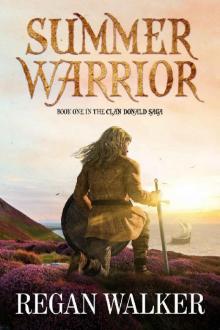 Summer Warrior (The Clan Donald Saga Book 1)
Summer Warrior (The Clan Donald Saga Book 1) Echo in the Wind
Echo in the Wind Once Upon a Christmas Past
Once Upon a Christmas Past A Secret Scottish Christmas (Agents of the Crown Book 4)
A Secret Scottish Christmas (Agents of the Crown Book 4) The Holly and the Thistle
The Holly and the Thistle Racing with the Wind (Agents of the Crown)
Racing with the Wind (Agents of the Crown) Wind Raven (Agents of the Crown)
Wind Raven (Agents of the Crown)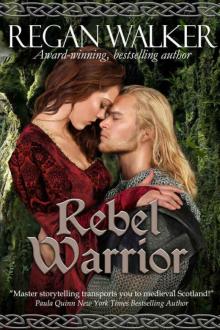 Rebel Warrior (Medieval Warriors #3)
Rebel Warrior (Medieval Warriors #3)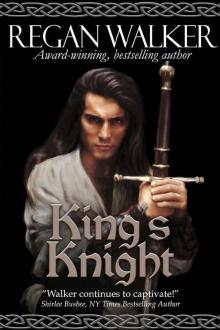 King's Knight (Medieval Warriors Book 4)
King's Knight (Medieval Warriors Book 4) The Twelfth Night Wager
The Twelfth Night Wager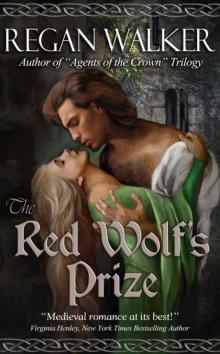 The Red Wolf's Prize
The Red Wolf's Prize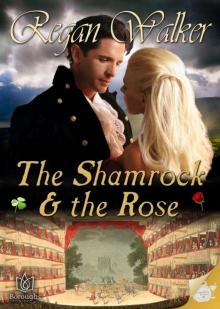 The Shamrock & the Rose
The Shamrock & the Rose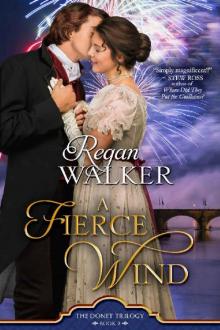 A Fierce Wind (Donet Trilogy Book 3)
A Fierce Wind (Donet Trilogy Book 3) Against the Wind (Agents of the Crown Book 2)
Against the Wind (Agents of the Crown Book 2)